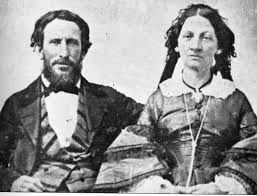The 49ers
- Jacqueline Heron Wray

- Apr 13, 2019
- 4 min read
Updated: May 31, 2022

The 49ers were pioneers who made their way to Sutters Mill, California, when gold was discovered there in 1848. The biggest influx began in 1849, hence the name. People from all over America and some from further afield undertook the onerous journey, mostly overland, across the mountains, setting up mining camps as they went. These camps had everything you could imagine – shops, saloons, banks, even brothels, and, of course, lawlessness. Towns and cities appeared as if from nowhere, built from whatever men could lay their hands on. Shrewd entrepreneurs made a fortune developing businesses to entertain, feed, supply and clothe the prospectors, one is still a household name today, Levi Strauss, a Bavarian tailor who made jeans for the gold miners from a durable material he had brought with him, originally intended to make wagon covers and tents.
Brothers John and Daniel Murphy had struck gold within days of arriving in the Sierra Nevada in 1848, inspiring many others to follow suit. Within a year, the Murphy brothers had mined $1.5 million worth, about $40 million equivalent today. (There is a town called Murphys in California today which was named after the brothers) Theirs is one of the success stories. Most other prospectors were not so lucky.
On the 16th of April 1846, the now infamous Donner-Reed party set off from Springfield, Illinois seeking adventure and, of course, fortune in the form of gold. The instigator had been James Frasier Reed. James took along his wife Margaret, and their four children, twelve-year-old Virginia, Patty, James and Thomas, and his mother-in-law. Reed, who was a successful businessman in Illinois, had an elaborate, two-story wagon made for his family so that they could travel in relative style and comfort. The wagon had spring-cushioned seats, sleeping bunks, and even an iron stove. It was so heavy that it took eight oxen to pull it. Virginia called it ‘The Pioneer Palace Car’. The group, comprising nine wagons, was led by brothers George Donner, a sixty-two-year-old farmer who had eventually settled in Springfield after moving around the country several times, and his equally adventurous brother Jacob. After six grueling months of crossing arduous terrain, tempers were fraying at the edges. On the 5th of October, two wagons became tangled up, and a driver called John Snyder whipped his oxen as punishment for the collision. James Reed was furious about the cruel treatment being meted out and demanded that John should stop beating the unfortunate animals. John did not stop. James Reed reacted by grasping for his knife, stabbing John in the stomach, and killing him. The party promptly dispensed their own form of justice. Although some thought James should hang, in the end, the party voted to banish James.
Reed was last seen leaving his family and the rest of the party riding off with a man called Walter Herron. (I feel another bit of family research coming on!)
“My father, with tears in his eyes, tried to smile as one friend after another grasped his hand in a last farewell. Mama was overcome with grief. At last, we were all in the wagons. The drivers cracked their whips. The oxen moved slowly forward, and the long journey had begun.” - Virginia Reed
While they were crossing the rough terrain of the Sierra Nevada Mountain range, one wagon suffered a broken axle. The party set up camp for the night to repair it. That night saw a snowfall of more than five feet. There were drifts up to sixty feet high; in short, it was one of the most brutal and fierce winters on record. The party became trapped. Of the eighty-one people stranded at Truckee Lake, more than half were under the age of eighteen, six were mere infants. Within three weeks of being trapped, they had used their food supply up. They killed their pack animals and dogs for food. They also began eating dirt, twigs, tree bark, and boiled leather.
Virginia Reed Murphy wrote about the family dog ‘Cash’,
“We ate his head and feet, hide evry thing about him."
The Donner's
dog ‘Uno’ was so hungry it ate a child’s shoe before he himself was eaten.
"When the meat gave out, the emigrants turned to the hides of the slaughtered animals, which, when scraped, cut into strips, and boiled, yielded a thick glue,"
Reluctantly, the decision was made to resort to cannibalism. One person would be sacrificed in order for the others to survive. They thought of drawing lots or even having a duel to decide who should be slain, but all too soon, some of the party died of natural causes. On Christmas Day 1846 they ate their first human, carefully labelling the flesh so that no one would eat their own kith and kin. Both George and Jacob Donner, their wives and children perished before rescue came some five months later. In all forty-one people died, forty-six survived; many of the survivors lost toes because of frostbite.
The Donner Pass is now known as The Lincoln Highway.
Extract from King Street to King's Road, by Jacqueline Heron Wray.
James and Margaret Reed.
San Francisco, 1851, courtesy Library of Congress.
#gold rush, #California, #1849, #Donner Reed, #Donner party,










Comments